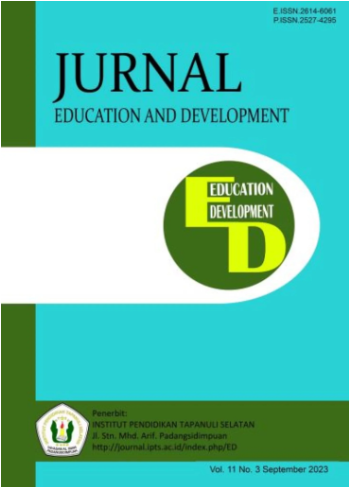PENERAPAN STRATEGI MENGINGAT UNTUK MENINGKATKAN MEMORI SISWA SMP DENGAN MILD INTELLECTUAL DISABILITY
Main Article Content
Abstract
Intellectual disability is defined as a condition in which an individual experiences significant limitations in intellectual and adaptive functioning. Intellectual disability can be identified before an individual reaches the age of 18. The impact of these limitations is evident in the individual's ability to gather and retain information, leading to difficulties in various aspects of daily life and education. This study aims to evaluate the effects of implementing memory enhancement strategies in improving the memory capacity of female junior high school students with mild intellectual disability. The research methodology employed a single-case experimental design, where the subject's ability data was collected as a baseline measurement before the intervention, and then compared with the subject's ability after receiving the intervention. The intervention consisted of six sessions conducted once a week, with each session lasting two hours. The results of the intervention demonstrated a significant improvement in the subject's memory capacity compared to the baseline data before the intervention. Evaluation also indicated that the subject successfully achieved the targets set by the relevant authorities after experiencing an improvement in memory ability.
Article Details

This work is licensed under a Creative Commons Attribution-NonCommercial-ShareAlike 4.0 International License.
References
Dehn, M. J. (2008). Working Memory and Academic Learning : Assesment and Intervention. John Wiley & Sons, Inc.
Guralnick, M. J. (2017). Early Intervention for Children with Intellectual Disabilities: An Update. Journal of Applied Research in Intellectual Disabilities, 30, 211–229. https://doi.org/10.1111/jar.12233
Heward, W. L., Morgan, S. R. A., & Konrad, M. (2017). Exceptional Children : An Introduction to Special Education. Pearson Education.
Hidayat, S. A., Erwansyah, R. A., & Lestari, A. N. (2021). LATIHAN SENAM OTAK UNTUK MENINGKATKAN KEMAMPUAN MEMORI JANGKA PENDEK PADA ANAK DISABILITAS INTELEKTUAL. JINTAN : Jurnal Ilmu Keperawatan, 1(2), 110–118.
Merrill, E. C. (2005). Preattentive orienting in adolescents with mental retardation. American Journal on Mental Retardation, 110, 28–35. https://doi.org/10.1352/0895-8017(2005)110<28:POIAWM>2.0.CO;2
Overton, T. (2016). Assessing learners with special needs: An applied approach (8th ed.). Peason.
Purba, I. N. B., Novianti, L. E., & Kendhawati, L. (2020). Working Memory Function Enhancement Intervention Using Padjadjaran Memory Rehearsal Application in Children with Mild Intellectual Disability. Journal PSIKODIMENSIA, 19(1), 1–7. https://doi.org/DOI:10.24167/psidim.v19i1.2179
Purnamasari, R. (2018). Strategi Pembelajaran Mnemonic untuk Meningkatkan Memori Siswa. SIPATAHOENAN: South-East Asian Journal for Youth, Sports & Health Education, 4(2), 125–138.
Purswell, K. E., & Ray, D. C. (2014). Research with Small Samples: Considerations for Single Case and Randomized Small Group Experimental Designs. Counseling Outcome Research and Evaluation, 5(2), 116–126.
Puspita, R., Kendhawati, L., & Noer, A. H. (2015). PERANCANGAN PADJADJARAN MEMORY REHEARSAL APPLICATION (PMRA) UNTUK MELATIH PEMFUNGSIAN WORKING MEMORY PADA MILD INTELLECTUAL DISABILITY USIA MENTAL 8 TAHUN. In Thesis tidak di publikasikan. Universitas Padjajaran.
Spencer, L. (2011). Strategies to Improve Working Memory in the Classroom. St. John Fisher University.
Tassé, M. J., Schalock, R. L., & Balboni, G. (2021). The construct of adaptive behavior: Its conceptualization, measurement, and use in the field of intellectual disability. American Journal of Intellectual and Developmental Disability, 117, 291–303. https://doi.org/10.1352/1944-7558-117.4.291
Tate, R. L., & Perdices, M. (2018). Single-Case Experimental Designs for Clinical Research and Neurorehabilitation Settings: Planning, Conduct, Analysis and Reporting. Routledge.
Vicary, S., Costanzo, F., & Menghini, D. (2016). Memory and Learning in Intellectual Disability. International review of research in developmental disabilities: Fifty years of research in intellectual and developmental disabilities, CHAPTER FOUR, 119–148. https://doi.org/https://doi.org/10.1016/bs.irrdd.2016.05.003
Widodo, S. A., Kustantini, K., Kuncoro, K. S., & Alghadari, F. (2021). Single Subject Research: Alternatif Penelitian Pendidikan Matematika di Masa New Normal. Journal of Instructional Mathematics, 2(2), 78–89. https://doi.org/DOI: 10.37640/jim.v2i2.1040

